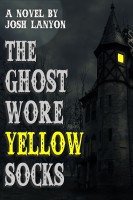The Brief History of the Dead - Brockmeier Kevin (книги бесплатно без регистрации TXT) 📗
As usual, Joyce was missing his point. But also as usual, he was not entirely wrong. Of course it mattered; Puckett had no doubt about that. Still, he answered, "All I'm saying is that we're powerless to affect what happens over there from over here. The arrow goes in one direction, and in one direction only."
"I'm not sure everybody would agree with you on that," Joyce said, but Puckett was too tired of the argument to ask him to elaborate.
It was much later in the day and he was walking home through the quiet, blue-lit streets when he realized that his older brother – the one who had died when he was only eleven, when Puckett was only four – must have continued out his days in the city until very recently, when Puckett himself had died and the memory of him had finally vanished from the face of the earth.
My God, Puckett thought. That was almost forty years.
He had already figured out that his parents, his grandparents, his wife, his son, the entire roster of people he had known over the course of his lifetime had remained in the city until the very moment he had died. He would even say that he had reconciled himself to the fact, though it was hard when it came to some people, he would admit: his son, for instance, who was only fifteen, after all, and just coming into the prime of his youth. But somehow the idea that his brother, who had been gone for such a long time, was one of those people had never occurred to him. It made him feel as though he had wandered into some strange empty building where a door at the end of a twisting hallway opened onto the bedroom he had slept in as a boy. He was almost afraid to step inside, but he knew he would regret it forever if he didn't.
By the time he got home, he had made up his mind. He would have to search out the city for any traces of his brother.
The investigation, as it turned out, was not as difficult as he had supposed it would be. His first thought was to track down some of the city's old census records and look for his brother's name inside. There was a vacated library around the corner from his building, the front door of which had been removed from its hinges and carted away by vandals at some point. While he knew that the shelves inside were mostly bare, it still seemed like the most obvious place to start. In the Archives Room, on the third floor, he found a cabinet labeled, miracle of miracles, CENSUS RECORDS – PAST FIVE YEARS. He used a metal ruler to jimmy off the lock. The cabinet had already been emptied out, though, and the only thing that remained inside was an old Vaseline jar filled with red rubber bands. He was about to leave when he saw a row of phone books stacked beneath the information counter. The books were almost ten years out of date. Still, though, he was able to find his brother's name inside, with an address listed on the outskirts of the monument district.
He tore the page out of the book along with a map that was folded into the back cover and took it along with him. There was a chill in the air as he navigated the streets. His ears began to ache, and so he pulled his collar up and pressed the fabric against his temples until he could hear the workings of his own body, that distant rumbling sound that always reminded him of logs rolling down a hill.
The map from the phone book seemed to be some kind of interpretive cubist diagram of the city rather than an actual map. A number of small streets – streets that were not displayed on the map at all – had been wedged in between others that were supposed to be directly adjacent. And some of the streets that were on the map had been disarranged slightly, intersecting at the wrong places, as though some careless shopper had taken them out to look at them and then put them back on the first shelf that came to hand. In one case, a weedy, half-dead golf course stretched over what ought to have been – but was not – four city blocks named for the great cities of Southern Africa: Kinshasa, Nairobi, Lusaka, and Johannesburg.
More than once Puckett had to retrace his steps and ask for directions. The sole of one of his shoes came loose and began to flap against the pavement.
All the same, he managed to find the building he was looking for.
He rode the elevator to the fifth floor, gave a precautionary knock on the door of the apartment listed in the phone book, and then took hold of the doorknob. He had expected the apartment to be empty – he didn't know why – but just as he was getting ready to open the door, a lanky middle-aged man answered. The man's glasses were smudged with some kind of transparent grease, and a feather duster of limp yellow hair trailed over his eyebrows. He was eating raisins out of a dixie cup.
"I help you?" he said after a few moments of silence, and Puckett realized he had been staring at the man like an imbecile.
"I'm sorry," he said. "I think I screwed up. I was looking for somebody who used to be at this address. Or maybe he did. At least I thought so."
The man popped a raisin into his mouth. "This somebody have a name?"
"Nathaniel Puckett."
"Mm-hmm. He cleared out – oh – about the tail end of the evacuation, I'd say. You knew him?" "He was my brother." "You Mikey?" "Well… Michael."
The man nodded and stepped aside. "Come on in then. Your brother and I were roommates."
Your brother and I were roommates. It was that simple, apparently. Puckett could hardly believe it. He sat down on a sofa that had been upholstered in a pattern of blue and white stripes, an enormous beast of furniture that took up half the room. There were no other chairs around, and so the man with the glasses sat next to him. "I suppose you want to ask me about your brother," he said. "Fire away. I'm not armed." He had finished his raisins, and he crushed the dixie cup and began transferring it slowly between his palms, smoothing out the folds and bulges. Everything about him seemed to amble along at its own deliberate speed, the lone exception being his habit of snipping off the beginnings of his sentences, which was a way of making up for lost time, Puckett guessed.
Puckett's brother had always been a mystery to him, a ghostlike stranger with a dirt bike and a broken neck who had collected comic books and stayed up late watching television and had once convinced Puckett to curl up into a ball at the bottom of his sleeping bag so that he could swing him in circles around the living room. That was all he remembered about him. But over the course of the next few hours, he learned any number of new things. Upon his death, apparently, Nathaniel had taken a room in one of the city's many orphanages, as most children did. He might simply have remained there – again, as most children did. But though he had never grown older than eleven, he had eventually decided to move out on his own. He continued to ride his bicycle for a few years, though it was a racing bike rather than a dirt bike this time. He was in three or four minor traffic accidents before he decided to sell the thing. Afterward, he became an affi-cionado of the subway system. On Sunday afternoons, he would ride the cars for hours at a stretch, taking them as far as the white clay district, while he stared out at the other cars and the dark tunnels and the aquariumlike spaces of the waiting platforms. For seven years he had worked in a hobby shop selling model airplanes and die-cast figurines to young men nostalgic for the childhood he himself would never lose. Then he had gotten a job pruning bushes at a greenhouse, and after that he had worked for a while as an assistant groundskeeper at one of the city's largest topiary gardens.
The man who was telling Puckett about him had been staying in the apartment's extra room for almost five years now. He and Nathaniel had met at a lecture on "The Comic Book as Literature," he said. The man had been an English teacher when he was alive, with a taste for what he called "illustrated novels." And as for Nathaniel, comic books still made up his main reading material. He had built up a sizable collection since he had arrived in the city. He invited the man to his apartment the day after the lecture to look at them.




